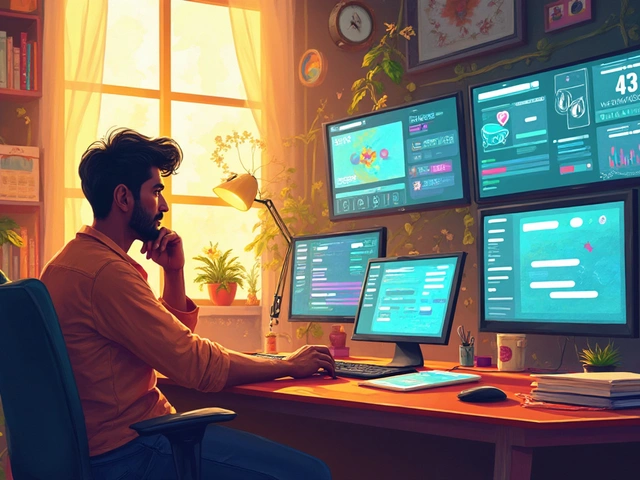
Some folks chase big titles, but let's be real—not everyone wants a stressful or ultra-competitive job. Stability and respect? You can get both without endless struggle. Government jobs are a lifeline for millions in India and beyond, offering security that private companies usually can’t match.
But which jobs are both good and actually possible to snag without years of studying or marathon competitive exams? You might be surprised—not every government job is buried under a mountain of impossible paperwork or open only to top-ranked students. Some roles are honestly more approachable, especially for people who want solid pay and benefits without burning out.
Whether you just finished school or you’re tired of getting stuck in contract gigs, knowing which government jobs are easier to get can save you a lot of time. Stick around—you’ll see practical tips, real examples, and straight-up advice on what works. Get ready to figure out the sweet spot between ‘easy’ and ‘worth it.’
- Why Choose a Government Job?
- Easiest Government Jobs to Get in 2025
- What Makes a Job 'Easy' or 'Best'?
- Eligibility and Qualifications Explained
- Smart Tips to Crack Competitive Exams
- Should You Aim Higher or Go for Easy?
Why Choose a Government Job?
If you’re on the fence about going after a government job, let’s lay out some hard facts. For starters, job security is the number one reason people crowd exam centers every year. You don’t hear about massive layoffs in government offices every other month like you do in the private sector.
Pretty much everyone talks about the perks too. From a guaranteed salary—no delays even in a slowdown—to health insurance that covers your family, the benefits are real. There are annual increments, fixed working hours (usually), provident fund, and paid leaves. Ever heard someone complain about not getting enough holidays in a government job?
Now, look at the numbers for a second:
| Factor | Government Job | Private Sector |
|---|---|---|
| Job Security | Very High | Depends on Company |
| Average Working Hours | 6–8 hours/day | 9–12 hours/day |
| Paid Leave | 35–45 days/year | 8–15 days/year |
| Retirement Benefits | Yes (Pension + PF) | Mainly PF (sometimes none) |
| Medical Coverage | Yes (family included) | Varies—often employee only |
Another biggie: best government jobs mean routine promotions. If you get in as a clerk, you can retire as a Section Officer, thanks to promotions and upskilling opportunities. Some jobs even come with government quarters, lifetime pension, and extra perks like travel concessions.
Here’s the kicker—competition is tough, but once you’re in, you’re sorted for decades. That’s a rare deal anywhere else. So, for folks who prefer peace of mind and a steady path, government jobs actually deliver what they promise.
- Steady monthly income—never late, even during crises.
- Allowances for rent, travel, and kids’ education.
- Social respect—many still see government workers as set for life.
- Extra focus on work-life balance. No calls at midnight, no sudden overtime.
Easiest Government Jobs to Get in 2025
If you're aiming for a best government job with less headache, there are a handful of roles you should check out. These are the jobs that often see huge numbers of applicants—not just because they're stable, but because the entry barriers are actually manageable if you prepare smart.
Some of the most accessible government jobs in India this year include:
- SSC Multi-Tasking Staff (MTS): Open to anyone who passed 10th standard. The exam isn't rocket science—think basic English, simple math, and general awareness. Last year, over 30 lakh applied and about 45,000 got selected.
- Railway Group D: The Indian Railways is the country’s largest employer and Group D posts (track maintainer, helper, porter, etc.) are among the easiest entry points. Eligibility: 10th pass. The 2023 cycle filled over 1 lakh vacancies.
- State Police Constable: States like UP, Maharashtra, and West Bengal have massive drives for constables. Exams are predictable, physical standards are basic (not Olympic-level!), and there are thousands of vacancies every year.
- Gramin Dak Sevak (GDS): These are postal jobs requiring just a 10th pass. Selection is often merit-based, with no written exam in many states. In 2024, India Post recruited over 40,000 GDS with very low cut-off marks in some circles.
- Clerk Posts in State and Central Departments: Every year, state Public Service Commissions conduct clerk exams. The papers are straightforward: reasoning, simple IT, and current affairs. For example, Punjab alone offered 2,500 clerk jobs last year.
Most of these jobs offer stress-free shifts, regular hours, and the kind of job security that's hard to find these days. If your plan is to settle down early or reduce family pressure, these are the go-to picks.
Here's a quick data snapshot for these jobs in 2024:
| Job | Minimum Education | Vacancies (2024) | Exam Difficulty |
|---|---|---|---|
| SSC MTS | 10th pass | 45,000 | Easy |
| Railway Group D | 10th pass | 100,000+ | Easy |
| GDS (India Post) | 10th pass | 40,000 | Merit-based |
| Constable (State Police) | 10th/12th pass | Varies (10,000+ in big states) | Easy to Moderate |
| Clerk (State PSCs) | 12th/Graduation | 2,000-5,000 (per state) | Easy |
One thing to keep in mind: "Easy to get" doesn’t mean "not worth it." The benefits—medical, pension, and job stability—are the same as higher posts. As Dr. Bhushan Kumar (former UPSC panelist) put it:
“Don’t underestimate so-called small government jobs. If you want security, regular income, and steady growth, these posts are gold for many young people.”
If you've been thinking government jobs are all about heavy competition and elite exams, it's just not the case. The real trick? Spot the right openings, stay updated, and apply early. These jobs could be your launchpad if you plan your moves right.
What Makes a Job 'Easy' or 'Best'?
Let’s get right to it: not every government job is built the same. Some are harder to crack, some have friendlier competition. When folks say a job is 'easy,' usually they mean it doesn’t need advanced degrees, the selection process isn’t a nightmare, and the syllabus is predictable. 'Best,' on the other hand, means stable salary, decent work hours, and job security.
Here’s the thing—not every job can check all the boxes. Some super secure roles have tough exams (like UPSC or state services), while others with simple exams pay less but offer quicker joining and solid perks. So, what should you look for if you want a practical government job in 2025?
- best government jobs typically have regular hours, decent pay, and guaranteed pensions. These are usually clerical, assistant, or group-D positions.
- ‘Easy’ jobs are those where the competition is not sky-high and the eligibility requirements stop gatekeeping average students. Think of postal assistants, railway clerks, multi-tasking staff (MTS), lower division clerks (LDCs), or state-level constable roles.
- Check the number of applicants per seat: Data from SSC MTS 2024 showed over 60 lakh people applied for about 15,000 posts. But local municipal or gram panchayat jobs can see almost 1/10th of that traffic—much easier odds!
- Look for jobs with straightforward exams. For instance, the Railway Recruitment Board (RRB) Group D tests only have basic math, reasoning, and general knowledge. No advanced stuff.
- Payscale matters, but so do on-the-job perks like medical benefits, travel allowance, and housing. Some ‘easy’ jobs make up for lower salaries with strong benefits.
Here’s a quick comparison of entry-level government jobs on important points:
| Job Type | Min. Qualification | No. of Applicants per Seat (2024) | Monthly Salary (INR) | Exam Difficulty |
|---|---|---|---|---|
| SSC MTS | 10th Pass | ~400 | 22,000-25,000 | Easy |
| Railway Group D | 10th Pass | ~350 | 22,000-27,000 | Easy |
| LIC Assistant | 12th Pass | ~500 | 28,000-32,000 | Medium |
| State Police Constable | 10th/12th Pass | ~250 | 23,000-26,000 | Medium |
| Gram Panchayat Clerk | 10th Pass | ~40 | 18,000-21,000 | Very Easy |
So, what makes a government job 'easy' is not just the paper qualification—it’s everything from competition to number of positions, the syllabus, and even the location. The 'best' job is the one that fits your life and future plans without driving you nuts. Take a close look at your strengths and your need for quick results before deciding which path fits you best.

Eligibility and Qualifications Explained
Before you start dreaming about that steady paycheck, you need to know if you actually qualify for the best government jobs. There’s no one-size-fits-all rule—every type of government job has its own set of requirements, and missing small details can ruin your shot.
Here’s what usually matters:
- Education: Some jobs need just a 10th or 12th class certificate (think clerk, multi-tasking staff, or office assistant). Others ask for a graduation degree (SSC CGL, banking exams) or even a post-graduate degree for specialist roles.
- Age Limit: Most government jobs have an age range you need to fit into. For freshers, it’s often 18-27 years. OBC, SC, ST, and disabled candidates usually get age relaxation for a few extra years.
- Citizenship: If you’re aiming for central or state *government jobs*, you must be an Indian citizen (some jobs need state-specific domicile certificates too).
- Physical Standards: Only for some posts like police, railways, or defense. Don’t stress—office-based jobs or lower-level staff jobs rarely ask for medical tests or fitness criteria.
- Computer Skills: Data entry, lower division clerk, or banking clerical jobs sometimes expect at least basic computer know-how or a course certificate.
One quick tip: Always double-check the official notification. Requirements can change from year to year, and relying on old info is a recipe for heartbreak.
For example, SSC MTS needs just a 10th pass, while SSC CGL won’t let you apply if you don’t have a graduation degree. Bank Clerk jobs usually need you to be a graduate and know basic computer stuff. Meanwhile, state-level jobs like Patwari or Village Revenue Officer often have language requirements or state residency proof on top of your marksheet.
So, before you start prepping, list out what you already have—certificates, marksheets, age proof, and anything else the exam asks for. Getting your paperwork lined up early is half the battle won.
Smart Tips to Crack Competitive Exams
If you get anxious just thinking about government exams, you’re definitely not alone. The seats are limited, the cut-off keeps jumping, and the competition is wild. But some tried-and-tested tricks can make a huge difference—especially if you want to bag one of the best government jobs without losing your mind.
- Don’t skip the syllabus. Sounds basic, but most people just skim it. Download the exact syllabus from the official website and tick off topics as you go. It stops you from wasting time on random stuff.
- Past years’ papers are gold. Treat them like treasure maps. Going through at least five years of actual question papers gives you patterns and a clear sense of the real difficulty level. Most official sites and trusted exam prep channels have them for free.
- Mock tests aren’t optional. One mock test a week is good; two is better. But don’t just take tests—analyze your mistakes. Figure out which topics eat your time or trip you up. Apps like Testbook or Oliveboard work on your phone, even if your Wi-Fi is patchy.
- Short notes win the game. Don’t take notes as if you’re writing a textbook. Make flashcards, charts, or even record short voice notes for revision. Once exam week hits, you’ll thank yourself.
- Stay updated on current affairs. Seriously, even for non-officer posts, current events matter. Use daily YouTube news capsules, monthly PDF downloads, or mobile apps made for daily quiz practice. Five minutes a day adds up big.
Also, never underestimate physical or medical criteria if your target job includes them—many get caught out late by ignoring eyesight or fitness standards in groups like SSC GD or Railways.
Set a strict schedule, skip distractions, and remember: nobody clears these exams by accident. Be consistent, even if it’s just two hours each day. That’s how you build up to a real breakthrough.
Should You Aim Higher or Go for Easy?
This is the one question that trips up almost everyone looking at best government jobs. If you’ve checked out job notifications lately, you already know the range is wild—from helper positions that only need a 10th pass, to high-end civil services asking for degrees and top marks.
Honestly, going for an "easy" job—like clerical roles in banks, post offices, or Group D staff in the railways—can land you decent pay, timely promotions, and a no-drama work culture. You won’t make headlines, but you will have financial stability, fixed hours, and decent perks like health insurance and pension. Don’t underestimate how much that matters, especially if you’re juggling personal responsibilities or just want life to be predictable. These jobs actually hire a lot of people, making the odds less scary compared to UPSC or State PCS exams where only a tiny percent make it through.
But what if you feel restless after a year of repetitive work? Sometimes "easy to get" does mean less excitement or slower career growth. If you’ve got the time and patience to prepare hard—especially for jobs like IAS, SSC CGL, or PSU engineers—it’s worth aiming higher. The salaries, official perks (like official accommodation, travel allowances, study leave), and the impact you get to make in these roles really are at another level. Some government jobs, like teaching positions or central government jobs with regular exams (like SSC), hit a sweet spot of being accessible while still offering growth and respect in society.
Think about these things before you settle:
- Your current financial needs—Do you urgently need a stable income?
- Your long-term goals—Would you feel stuck after a few years in a support-level job?
- Your strengths—Are you more patient, do you like routines, or do you get bored easily?
- Your support system—Would your family back you up if you chose a tougher path with more preparation?
If you’re young or can afford a few years preparing, it’s smart to try for higher-level exams first. If life’s too chaotic or you just need a job now, “easy” jobs are not a cop-out—millions find satisfaction and success there. And hey, some people crack a basic job now and use the stability to keep preparing for something bigger on the side. There’s no single right answer—figure out which government job fits your life, not someone else’s success story.





